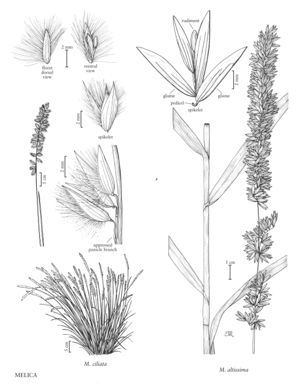Difference between revisions of "Melica altissima"
imported>Volume Importer |
imported>Volume Importer |
||
| Line 43: | Line 43: | ||
|publication year= | |publication year= | ||
|special status=Introduced | |special status=Introduced | ||
| − | |source xml=https:// | + | |source xml=https://bitbucket.org/aafc-mbb/fna-data-curation/src/2e0870ddd59836b60bcf96646a41e87ea5a5943a/coarse_grained_fna_xml/V24/V24_130.xml |
|subfamily=Poaceae subfam. Pooideae | |subfamily=Poaceae subfam. Pooideae | ||
|tribe=Poaceae tribe Meliceae | |tribe=Poaceae tribe Meliceae | ||
Revision as of 20:49, 5 November 2020
Plants loosely cespitose. Culms 60-250 cm, not forming corms, scabrous below the panicles. Sheaths retrorsely scabridulous; ligules 3-5 mm; blades to 20 cm long, 5-15 mm wide, flat, lax. Panicles 10-20 cm long, 1-2(5) cm wide, cylindrical, pale or purplish; branches about 3 cm, strongly ascending to appressed, often with 15+ spikelets; pedicels sharply bent below the spikelets; disarticulation below the glumes. Spikelets 7-11 mm, with 1-2(3) bisexual florets. Glumes subequal in length and similar in shape, 7-10.5 mm long, 3-4 mm wide, glabrous, ovate-elliptic, obtuse to acute, ivory or purple, 7-veined; lemmas 7-11 mm, glabrous, scabridulous, 9-13-veined, scarious, apices acute; paleas about 2/3 the length of the lemmas; rudiments 2.5-3 mm, pyriform. Caryopses about 3 mm. 2n = 18.
Distribution
N.Y., Okla., Ont.
Discussion
Melica altissima is native to Eurasia. It is grown as an ornamental in North America and is reported to have escaped and become established in Oklahoma and Ontario. In its native region, it grows on the moist soils of shrubby thickets and forest edges, and on rocky slopes. Plants with dark purple glumes and lemmas can be called M. altissima var. atropurpurea Host.
Selected References
None.
